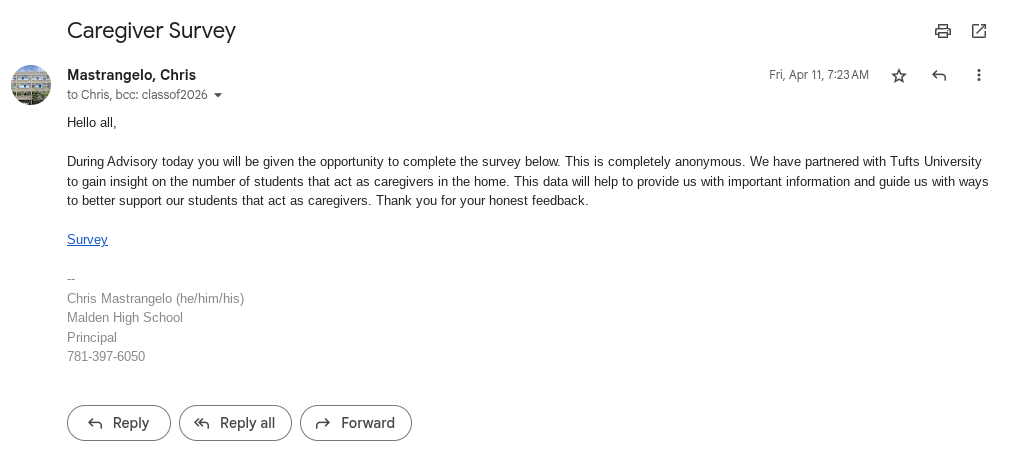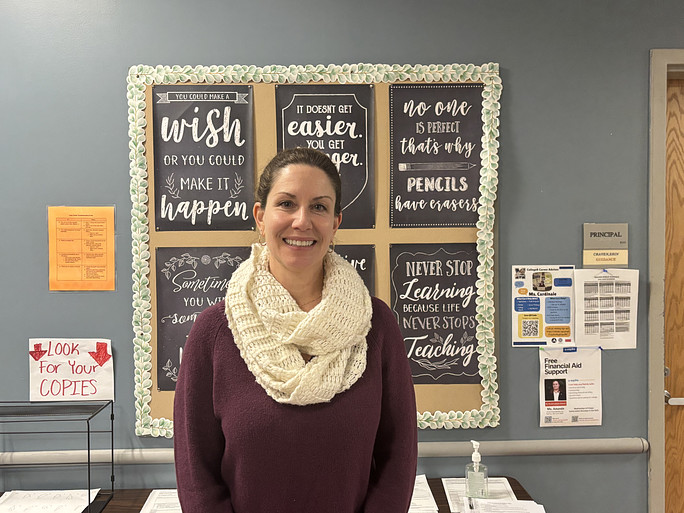
A well-crafted schedule can be vital to the success of any student. It is the foundation on which they manage their time, academic responsibilities, and extracurricular activities. Yet, as the school year nears its final months and students begin envisioning their future schedules, a question arises: How will students react when faced with a possible change to the ordinary schedule?
The Commonwealth of Massachusetts requires all high school students to have 990 hours of structured learning time throughout the school year. This guideline dictates how the high school bell schedule is divided to ensure students fulfill their academic requirements.
One of the main causes behind possibly changing the schedule is the surplus of directed studies students on the schedule. Timothy Sippel, Superintendent of Malden Public Schools, described, “We have a very large percentage of students at Malden High who don’t have a full schedule, who have one, two, three, four [periods]where they’re taking a direct study instead of regular class. We don’t feel that’s equitable, and it also doesn’t meet the requirements of structured learning time from the Commonwealth of Massachusetts.”
On March 20th, administrators sent out an email to the classes of 2026, 2027, and 2028 regarding a survey about the bell schedule. The survey looked into the lengths and frequencies of classes, as well as the Advisory and Enrichment blocks.
Freshman J.B. Mac explained the significance of participating in the survey: “I definitely think this [survey] is a really important thing; if they changed it without us knowing, it would cause a lot of students to either panic and worry or just be angry, which is something that should not be happening in school.”
To make the schedule evaluation process most effective, reaching out to students who are “going to end up following this schedule, it’s important that staff and administrators listen to the students who are going to experience the consequences of what they do,” junior Danielle Harrington concurred.
Upon completing the survey, students were left with strong opinions on the potential schedule changes and began proposing their adjustments to the current schedule to accommodate their needs.
When observing their current schedules, many students did not see the need for change because they believe it fulfills their academic and social needs. “I like [the schedule] as it is now because things like enrichment give you time to work on things you might’ve missed in class. And Flex block is a way for people to decompress once in a while,” sophomore Yawen Zuo shared.
While the schedule might be satisfactory academically, students feel the Joy block could be expanded. “I’m satisfied with our period times as it allows us enough time to learn and understand material daily, and otherwise, the only thing I would like to change is our Joy block. I believe we should extend joy to allow kids to enjoy themselves more,” sophomore Eric Lin suggested.
The Advisory block is another aspect of the current schedule that students are skeptical of due to the inconsistency of what is being done in each class. Freshman Alexis Lee described how “in Advisory, we don’t really do anything. My classroom is just silent, we’re either doing work or chilling on our phones. I heard different advisors do different things, like some people have to actually put their phones away and talk in discussions. I think Advisory is important to have if the teacher actually engages students.”
Unfortunately, despite there being a shared curriculum during Advisory that each class should be engaging with, this is not always the case. This has led students and administrators alike to think that there could be better uses for these valuable minutes in our schedule.
Harrington stated that specifying what teachers are allowed to and not allowed to do during Advisory could improve the atmosphere in the class. “A lot of times, when I’m in these classes, my Advisory teacher will tell me that I can’t do my work; meanwhile, I hear that other Advisory teachers say you can do anything. Maybe it should be made clear what students are actually allowed to do in those time blocks,” she continued.
A possible schedule that is weighing on students‘ minds is the waterfall schedule. This schedule would have six periods meeting in a day on a rotating schedule. Students have shown their distaste for this schedule due to various factors.
Sophomore Ian Ho claimed that the waterfall schedule may harm student-athletes specifically due to practices being “after school and roughly two hours long,” creating an imbalance between workload and stress on these individuals.
A common concern amongst students is how increasing the frequency of classes in a day will impact their workload. The current 3-period and 4-period a day alternating schedule benefits students in managing their homework significantly. Freshman Alyssa Lynch highlighted, “I like having the extra day to do my homework and manage my time.”
While managing an increased workload due to an increase in class frequency can already be difficult, students oppose the waterfall schedule when taking into consideration the academic rigor present in their schedules. “In middle school, [the waterfall schedule] was fine considering the classes weren’t that hard and it was the same for everyone, but if we were to do it now, the APs would pile up, the Honors classes would pile up, even the CP classes. It would just be too much work to complete in one day,” sophomore Raquel Ferreira analyzed.
Sippel explained his thoughts concerning workload, where “a lot of schools that have seven-period days, I’d be curious to know for those schools how they can manage that workload for students when they don’t have the blue and gold alternating class situation. I’m confident that there’s a way, but we would have to have some intentional conversations about potential guidelines about how much homework should be assigned on a given night for each class.”
The future is unclear for Malden High students, as over the next few months, however, the administration will continue to look into possibilities of different schedules for next year to best accommodate student learning. One thing can be said for certain: the academic and emotional well-being of all students will remain the priority when discussing the schedule.




